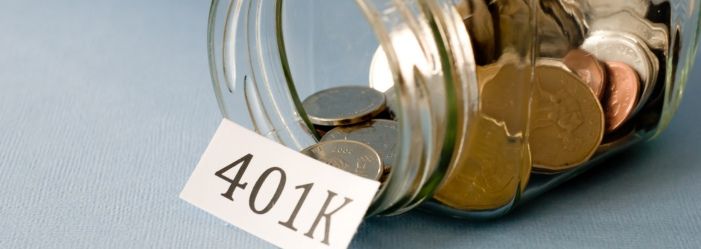Last Updated: March 25, 2024

Is it Good To Pay Off Your Credit Cards With a 401k Loan?
If you have high credit card balances and are looking for a way to pay them off, that money in your 401k retirement account may seem like a great option. After all, credit cards are due every month but retirement is potentially a long way away. Should you take out a loan from your 401k to pay off those high-interest credit card bills? The short answer is No! The slightly longer answer is Probably Not. But before you decide, let’s take a look at how a 401k loan works and what are the pros and cons for taking out a loan.
What is a 401k Loan?
The 401k retirement account is administered by your employer. Since every employer has different rules for 401k loans, always check with your plan administrator to see if a loan is possible. There are some COVID-19 relief options for 401k loans, so check with your plan administrator.
In general, most 401ks do allow users to borrow no more than 50% or $10,000, whichever is greater of the vested balance with a total amount of no more than $50,000.
About 20% of 401k accounts have a loan against them. It is a relatively simple low-interest loan that can be used to consolidate credit card debt and pay it off. The question is, should you?
401k Loan Pros and Cons
Like any loan, there are pros and cons to taking out a 401k loan. Unlike other loans, you run the risk of serious tax consequences. Let’s examine both – just remember we are not tax advisors, so always speak with a tax professional to see how a 401k loan will affect you.
401k loans tend to have lower interest rates. They are prime rate (set by the Federal Reserve) plus one percentage point. As of December 3, 2020, the prime rate is 3.25%, so you would pay 4.25% on your 401k loan. The current personal loan rate ranges from 4.99% to 36%, depending on your credit rating and income amount.
The 401k loans generally have a five-year term of repayment while personal loans range from one to seven years.
Your interest payments get returned to your account since the loan is against your money. That is different from a personal loan where the interest payments go to the lender.
Since there is not a credit check before taking out a 401k loan you will not be penalized by either higher interest rates for a lower credit score or a hard pull on your credit score.
Taking money out of your 401k can severely impact your retirement savings. In fact, some 401k plans prohibit contributions while you have an outstanding loan. We’ll go over those numbers in the next section.
If you leave your 401k associated job with an outstanding loan on the 401k, you have until April 15 of the tax year to either repay the loan or roll the balance over into another eligible retirement account. This means that if you leave your job in December 2020, you have until April 15, 2021 (plus extensions if used) to repay your 401k loan.
If you are so far in debt that you are considering bankruptcy, bear in mind that credit card debt is more easily discharged in bankruptcy while your 401k is untouchable.
And finally, paying off your credit card debt with a 401k loan doesn’t address why you ended up with excessive debt in the first place. Using a 401k loan without credit counseling or understanding why you ended up there will most likely not result in a debt-free lifestyle.
401k Loan Effects on Retirement
Now, let’s look at how a 401k loan will affect your retirement. These figures were formulated using the Vanguard Retirement Loan Calculator.
Loan amount: $10,000
Term: 5 years
Interest rate on loan: 4.3%
Return on investment (est. 5-8%): 6.5%
Monthly payment: $186.00
Total interest paid: $1,131
After 5 years, your 401k will be: $717 less than it would have been
That $717 doesn’t seem like much, does it? In 30 years, that $717 could have compounded enough interest to be $5,015.
In addition, if you make a $100 contribution every month and your employer matches it $100, consider how much you lose over the five years if you are not legally allowed to make a contribution: $14,350. For most working Americans, that is a lot of money. You are now not $717 in the hole, but $15,067. And over 30 years, that really will add up in lost compounded interest (over $100k).
Should I Take Out a 401k Loan?
As you can see, there are some serious drawbacks to taking out a loan from your 401k. Most experts recommend trying almost anything else!
If you do choose to take out a 401k loan, consider the following suggestions first:
- Understand and fix how you managed to get into debt the first time
- Stop using credit cards until all your debt is paid off
- Continue contributions and matches if possible
- Borrow only as much as you know you can repay in a short amount of time (generally 1 year or less)
Other Options
If you look through the articles in our blog, you will find suggestions for getting out of debt and more specific guidance. These options include:
- 0% balance transfer credit card
- Personal loan
- Credit counseling from a reputable company
- Budgeting
- Side hustle income
- Debt consolidation
- Debt settlement
- Bankruptcy
Bankruptcy should be your absolute last resort! If this appears to be your only way out, consider talking to the debt settlement professionals at Pacific Debt, Inc. We can help you to understand all your options.
FAQs
Conclusion
While a 401k loan may seem like an easy way to pay off nagging credit card debt, digging into your retirement savings should only be a last resort. The pros are tempting - low-interest rates and paying yourself back rather than a bank.
However, the cons simply outweigh the pros in most situations. Lost retirement savings and missed investment returns down the road, taxes and penalties if you can't repay the loan, and failing to address underlying spending habits all make this an option to avoid if at all possible.
Instead, consider alternatives like balance transfer cards, personal loans, working with a non-profit credit counseling agency, making a budget and cutting expenses, or taking on a side hustle to earn extra income. These moves will put you on the path to becoming debt-free without putting your financial future at risk.
As always, talk to a certified financial expert or credit counselor to discuss your full range of debt relief options. With some planning and discipline, you can eliminate your credit card debt without touching your hard-earned 401k.
Pacific Debt, Inc
If you have more than $10,000 in credit card debt and are struggling to make the payments, Pacific Debt, Inc. may be able to help. We can help explain all your options and help you decide which is the best one for you. We can even refer you to one of our trusted partners who can better meet your needs.
If you have more questions, contact one of our debt specialists today. The initial consultation is free, and our debt experts will explain your options.
Disclaimer: Pacific Debt, Inc. is not a law firm and this article should not be construed as legal advice. Only a licensed attorney in your state can provide legal advice.
✔ Accredited by Better Business Bureau with BBB A+ rating (4.93 rating and 1678 reviews)
✔ US News and World Reports and Bankrate ranked Pacific Debt Relief as one of “The Best Debt Relief Companies of 2024”
✔ 6.9 star rating by BestCompany.com (over 2379 client reviews)
✔ 4.8 star rating by TrustPilot based (over 1613 verified consumer reviews)
✔ ConsumerAffairs.com Accredited (over 544 verified reviews with an average rating of 5 stars)
✔ A Top 10 Rated Compan by TopTenReviews.com , ConsumersAdvocate.com and Top10debtconsolidation.com
✔ 4.6 star rating by Google (229 client reviews)
✔ 100% rating by SuperMoney (9 client reviews)
Reduce Your Credit Card Debt By Up to Half

BBB Reviews | 4.9/5.0 Rating









 Do Not Sell My Personal Information
Do Not Sell My Personal Information